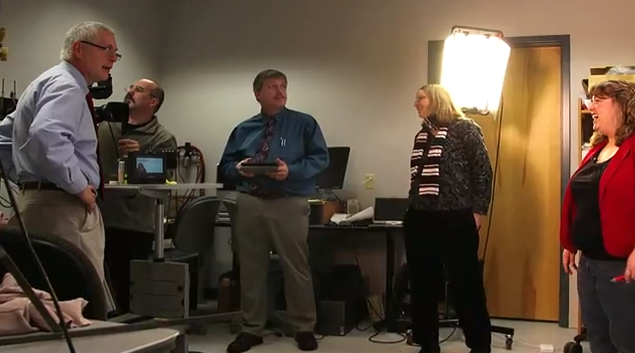Posted 2:44 p.m. Tuesday, Oct. 15, 2013

UW-L faculty and staff have received a national grant to study the effectiveness of a new, online learning option that some believe has the potential to make college more personalized and affordable.
 UW-L faculty and staff develop the video component of UW-L's first MOOC. From left, Jim Jorstad, director of ITS/Academic Technologies; Jeff Kerkman, Academic Technologies; Robert Hoar, professor of mathematics and associate vice chancellor for Academic Affairs; Jennifer Kosiak, associate professor of mathematics; and Maggie McHugh, associate lecturer in the mathematics and director of UW-L’s Murphy Learning Center.[/caption]
UW-La Crosse faculty and staff have received a national grant to study the effectiveness of a new, online learning option that some believe has the potential to transform higher education and make college more personalized and affordable.
UW-L was a successful applicant for a competitive grant competition run by Athabasca University (Principal Investigator: George Siemens). This project, the MOOC Research Initiative, will advance understanding of the role of MOOCs — Massive Open Online Courses — in the education sector and how emerging models of learning will influence traditional education. The MOOC Research Initiative is a project funded by the Bill and Melinda Gates Foundation.
The $20,000 grant will allow UW-L faculty and staff to study data gathered from UW-L’s MOOC, which was offered for the first time in winter, summer and fall of 2013.
A MOOC is a free course open to anyone with an Internet connection. UW-L’s course, the first MOOC in the UW System, was designed to prepare students for college-level math and science courses so they don’t need to take developmental math and can ultimately graduate in less time and at lower costs.
UW-L faculty and staff develop the video component of UW-L's first MOOC. From left, Jim Jorstad, director of ITS/Academic Technologies; Jeff Kerkman, Academic Technologies; Robert Hoar, professor of mathematics and associate vice chancellor for Academic Affairs; Jennifer Kosiak, associate professor of mathematics; and Maggie McHugh, associate lecturer in the mathematics and director of UW-L’s Murphy Learning Center.[/caption]
UW-La Crosse faculty and staff have received a national grant to study the effectiveness of a new, online learning option that some believe has the potential to transform higher education and make college more personalized and affordable.
UW-L was a successful applicant for a competitive grant competition run by Athabasca University (Principal Investigator: George Siemens). This project, the MOOC Research Initiative, will advance understanding of the role of MOOCs — Massive Open Online Courses — in the education sector and how emerging models of learning will influence traditional education. The MOOC Research Initiative is a project funded by the Bill and Melinda Gates Foundation.
The $20,000 grant will allow UW-L faculty and staff to study data gathered from UW-L’s MOOC, which was offered for the first time in winter, summer and fall of 2013.
A MOOC is a free course open to anyone with an Internet connection. UW-L’s course, the first MOOC in the UW System, was designed to prepare students for college-level math and science courses so they don’t need to take developmental math and can ultimately graduate in less time and at lower costs.
“There has been national interest in MOOCs for a couple of years, but it was surprising how quickly our MOOC gained national attention,” says Bob Hoar, UW-L associate vice chancellor of academic affairs and principal investigator on the grant.A relatively new concept in higher education, researchers, academics, students and policy makers are all eager to learn how effective MOOCs are in teaching and learning. MOOCs are different from traditional courses not in terms of what is taught, but who is taught. Developers don’t know the backgrounds of students in the course since anyone of any age or experience can sign up. Also, there is no penalty for dropping out or enforced attendance or participation. “Answering questions relating to 'who' is the course helping, and 'which elements' are doing the most good will allow us to modify the course to broaden the impact and to advertise it better so that people will know if the course is right for them,” says Hoar. Specifically, UW-L’s study will be able to examine the student characteristics that correlate to success, the effectiveness of the online learning materials, what areas of college readiness are enhanced through the MOOC and more. UW-L’s selection for the grant came after a highly-competitive process. The MRI received 266 pre-proposals and invited 79 research teams to submit full proposals. In the end, only 25 projects were funded. The reviewers gave the Math MOOC proposal offered UW-L high marks because of the quality of the proposed work, the planned data acquisition and research methods, the expertise of the research team, and a clearly defined project scope. “The researchers have posed an important question that remains unanswered about MOOCs, namely to what extent they can serve a diverse population of learners … This study has the potential to provide an excellent template for how rigorous course-level research can be done for MOOCs, and the research team is well qualified to undertake this work,” noted a member of the selection committee.
Who’s involved in UW-L’s new MOOC research?
- Natalie Solverson, director of Institutional Research, will compare the MOOC’s impact on students to the typical university course.
- Cari Mathwig-Ramsier, D2L coordinator in Academic Technology Services, will study the effects and implications related to the online design of the course.
- Bob Hoar, UW-L associate vice chancellor of academic affairs, and Jenn Kosiak, associate professor in the Mathematics department, the original PIs on the MOOC grant, are interested in the math that was learned and want to study the long-term impact that this course will have on students who participate.
